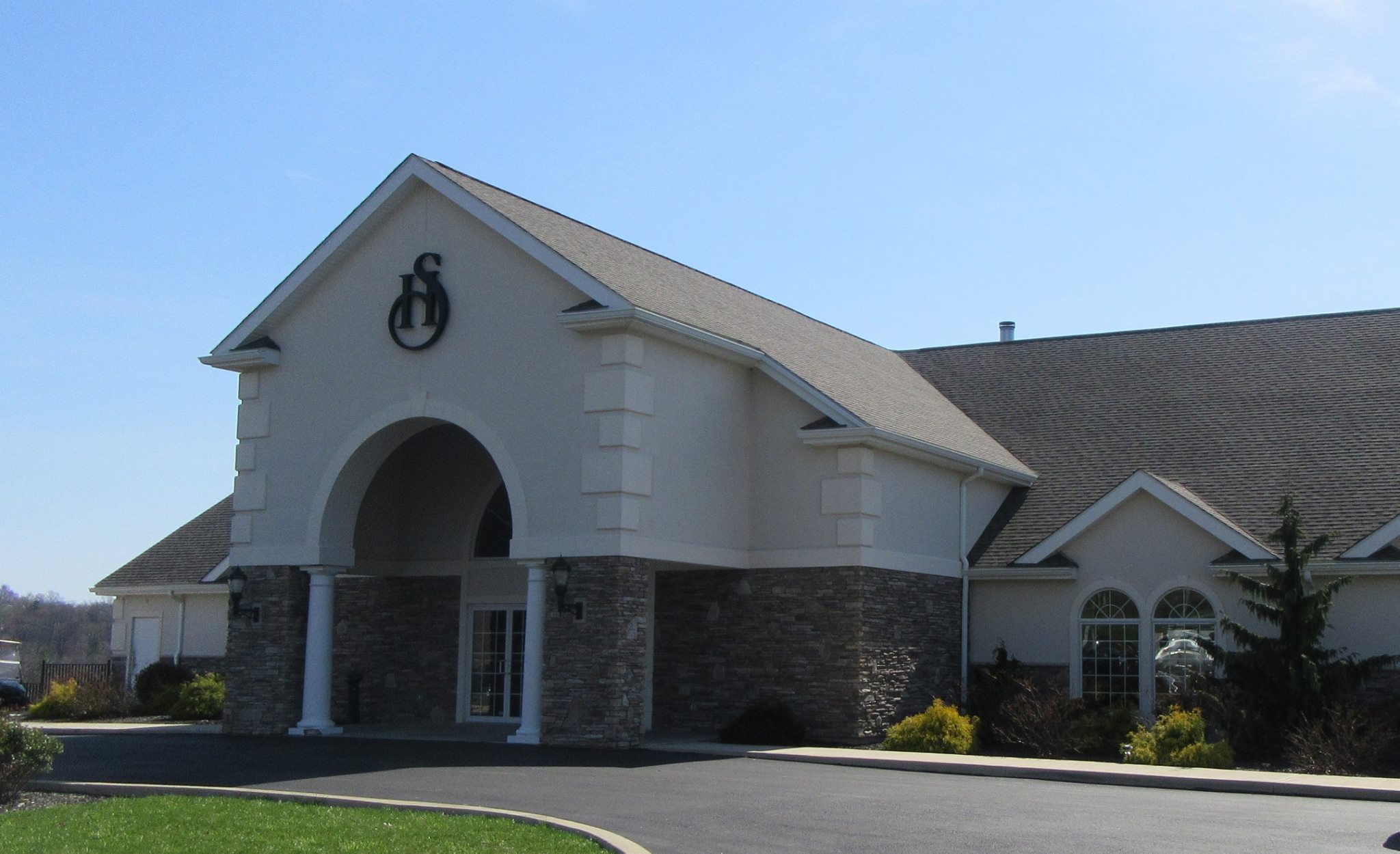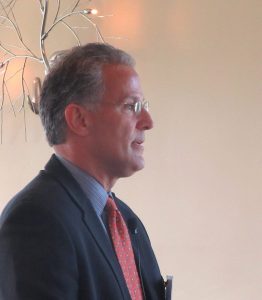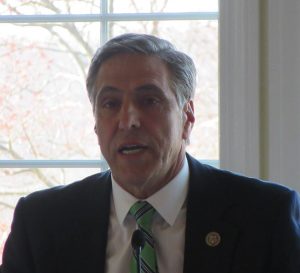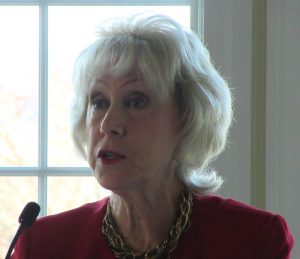Story and Photos by Rick Hiduk
Local business leaders were anxious to hear what our legislators at the state and national level had to say about the future of our region from their varied perspectives this morning. Thanks to the Wyoming County Chamber of Commerce, they were able to learn a lot. The WyCCC hosted a Legislative Breakfast on April 11 at Stone Hedge Golf Club (top). Key speakers included U.S. Congressman Lou Barletta, State Sen. Lisa Baker, and State Rep. Karen Boback.
In short, Congressman Lou Barletta touts tax reform as the logical way to fund the infrastructure investment promised by President Donald Trump. State Sen. Lisa Baker is concerned that Gov. Tom Wolf’s proposed consolidation of four human service agencies into one $40-billion dollar department by July 1 is “overly ambitious.” And Rep. Karen Boback asked for patience on the part of Pennsylvanians as Harrisburg tries to balance a budget of which 82% is earmarked for education and human services.
George Stark (below) of event sponsor Cabot Oil & Gas monitored the discussion, posing several questions of his own before taking questions from the audience of about 150 guests. He opened by asking Barletta to talk about pipelines and expound upon a remark he’d made earlier, referring to northern PA’s natural resources as “a keg without a tap.”
Barletta said that President Trump understands the importance of infrastructure like natural gas pipelines and the length of time that it takes to get permits and projects started. That is why, Barletta (below) asserted, that tax reform is the most important part of Trump’s current agenda. Once businesses start to realize a break in taxation, all of America will feel comfortable investing in the future.
(Barletta apologized for the recent health care debacle more than once, citing it as premature and distracting from a greater need to get the economy moving.)
“Backing off of regulations” put in place by the Obama administration, he added, would put the energy business on the fast track. “We have countries around the world that would love to buy natural gas, and we’d like to be able to get it to them,” he stated.
Sen. Baker was asked about Pennsylvania’s health care issues and the expansion of Medicare. She prefaced her comments by referring to uncertainty over the federal governments commitment to health care as a “wild card” that makes solving the state’s health care woes frustrating.
When Pennsylvania agreed to the expansion of Medicare, she explained, the federal government covered 100% of the expansion. That percentage is already down to 95%, which puts Pennsylvania on the hook to find $52-million in its budget to maintain the funding level for elderly and at-risk people.
“If it dries up to 50%, that leaves Pennsylvania with $5 to $6-billion to pick up,” she stated.
Pennsylvania already has one of the most expensive health care systems in the nation, Baker related, and she is not a fan of “block grants” by the federal government as an alternative, as it leaves the state with very little say in how the programs are run.
Rep. Boback (below) was quick to respond to a question by Chamber member Art Sherwood about how the government can stimulate a populous that seems to have grown accustomed to unemployment compensation, welfare, and nearly free health care. “Working people are getting tired of paying for health care and other services for people who won’t work,” he stated.
“We need to encourage people who really want to work and discourage those who are living of the system,” Boback agreed.
As deputy chair of the state’s Policy Committee, Boback maintained that she and fellow committee members are proposing photos on ACCESS cards so they can not be used by any one other than intended. She’s also a proponent of routine drug testing for recipients of welfare.
“Are you using tax payer dollars to support your habit?” Boback mused, adding, “These are not new ideas, but there is much more momentum.”
“The government has made it too easy not to work,” Barletta concurred, blaming, to some extent, the relaxation of the requirements for welfare. “The government has to get back to tough love again. We’ve got to go back and teach people the skills for the jobs that actually exist.” Barletta also supports measures that will reduce fraud by routinely verifying social security numbers and requiring people to work for government subsidies.
Baker thanked Cabot Oil & Gas and Stark personally for taking the business model to the schools. Stark shared the credit with Southwestern Energy and and Williams company for developing outreach programs designed to give students as early as the fifth grade an idea of the skills that they will need to succeed in the workforce.
“We have told kids for years that they have to go to college to get a good job, (but) not every kid has to go to college,” Baker continued. She conceded that the government must do better at convincing the public that there are plenty of good jobs available. Otherwise, she noted, it is no surprise that one in four Pennsylvanians is dependent on some kind of public service.
Returning to the topic of over-reaching rules and regulations, one audience member asked the panel how some policies seem to gain traction without the support of state representatives.
Baker explained that, if a Pennsylvania agency such as the DEP proposes a rule, it doesn’t necessarily become law. It must pass before the Regulatory Commission.
“We don’t necessarily get to vote on it. Committees do get to weigh in and vote down a process or rule, but it doesn’t always happen,” she related. “The role that we play is to hold them accountable. It is cumbersome and not always easy to navigate.”
In response to a complaint about the Food Safety Modernization Act that would increase the number of convenience store items that can be purchased with ACCESS cards, Barletta indirectly blamed a flawed immigration policy that is hurting farmers.
“Importing more and more food is a national security problem,” said Barletta. “We need to get back to making it easier for farmers to farm.” Conceding that the current administration has made immigrants the enemy of the people, Barletta suggested that a different approach is needed when it comes to agriculture. He supports a guest worker program to help growers get their produce to market.
Boback took an interest in the audience member’s reference to “private equity investment strategies” employed in other states that support the production of produce and other products locally to reduce the need for imports. She asked him to contact her for a private meeting. “Agriculture is the number one industry in our state, and we need to keep it that way,” Boback maintained.
None of the panel members could adequately address a question by Anne Marie Stevens of Tyler Hospital about how to attract specialists to rural hospitals and keep them. Baker agreed with her that advances in technology – specifically “telemedicine” – to provide more professional services to remote medical facilities hold great promise. She referenced a stroke victim as an example of someone a specialist could assist remotely with great success.
Each of the panel members nodded in agreement to Stevens’ concerns about the opioid crisis facing the state and nation. Baker said that she has worked with Sen. Gene Yaw to ensure that first responders and medical facilities have access to Naloxone, the antidote for a heroin overdose.
Barletta suggested that the Affordable Health Care Act provided $10 million to states to deal directly with addiction and other mental health issues but without adequate oversight.
“We ask Americans to be accountable, but our government doesn’t hold itself to the same standards,” he stated. The SafeCare plan, he related, was supposed to monitor babies born to addicts. When the time came to fix and/or replace the AHCA, he continued, statistics indicated that only nine states were maintaining adequate records of how the money was being spent and the ongoing health and safety of the babies.
Barletta said that he was hopeful that Pennsylvania was among those nine states but, as of yet, cannot confirm that the Commonwealth is accountable for the SafeCare plan. He is encouraged by a new bill that will prevent a baby born to addiction to be returned to his or her mother until she is proven to be clean. “Until then, they will remain in foster care,” he insisted.
Alex Fried of Procter & Gamble asked Barletta for a general time line on Trump’s proposed tax reform. “We see a lot of out competitors (globally) with lower tax rates,” Fried related.
Barletta replied that he is hopeful that something will happen before August, but he cautioned that stumbling blocks such as Congressman Paul Ryan’s plan to reduce export taxes to 0% while holding import taxes at 20% will be a hard sell. “It sounds good in theory,” said Barletta, but the challenge will come from retailers like WalMart and Target who will complain about having to pass that cost on to lower and middle-class Americans.
“We have the highest tax rates in the world and the most regulations,” Barletta asserted. “We can ship products around the world faster than anyone else because of our infrastructure, but we need to keep investing in that infrastructure.”
To read more about the April 11 Legislative Breakfast, click on http://www.endlessmtnlifestyles.com/?p=7124. To learn more about the Wyoming County Chamber of Commerce, log on to www.wyccc.com.



